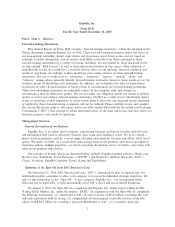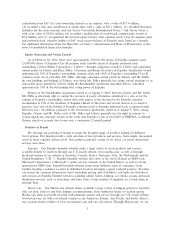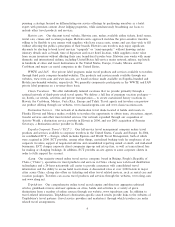Expedia 2005 Annual Report Download - page 19
Download and view the complete annual report
Please find page 19 of the 2005 Expedia annual report below. You can navigate through the pages in the report by either clicking on the pages listed below, or by using the keyword search tool below to find specific information within the annual report.Declines or disruptions in the travel industry, such as those caused by terrorism, war, inclement
weather, health concerns, bankruptcies and/or general economic downturns, could adversely affect our
business, financial condition and results of operations.
Our business, financial condition and results of operations are affected by the health of the worldwide
travel industry. Accordingly, downturns or weaknesses in the travel industry could adversely affect our
business. Travel expenditures are sensitive to business and personal discretionary spending levels and tend
to decline during general economic downturns. Events or weakness in the travel industry that could
negatively affect our business include price escalation in the airline industry or other travel-related
industries, airline or other travel related strikes, airline bankruptcies or liquidations and fuel price
escalation. Additionally, our business is sensitive to safety concerns, and thus may decline after incidents of
terrorism, during periods of political instability or geopolitical conflict in which travelers become concerned
about safety issues, as a result of inclement weather such as the hurricanes that affected the markets
around the Gulf of Mexico in 2005 or when travel might involve health-related risks, such as avian flu.
Such concerns could result in a protracted decrease in demand for our travel services. This decrease in
demand, depending on its scope and duration, together with any future issues affecting travel safety, could
significantly and adversely affect our business, financial condition and results of operations over the short
and long-term. In addition, the disruption of the existing travel plans of a significant number of travelers
upon the occurrence of certain events, such as terrorist activity or war, could result in the incurrence of
significant additional costs if we provide relief to affected travelers by not charging cancellation fees or by
refunding the price of airline tickets, hotel reservations and other travel products and services.
We depend on our relationships with travel suppliers and any adverse changes in these relationships
could adversely affect our business, financial condition and results of operations.
An important component of our business success depends on our ability to maintain our existing, as
well as build new, relationships with travel suppliers and global distribution system (""GDS'') partners.
Adverse changes in existing relationships, or our inability to enter into new arrangements with these parties
on favorable terms, if at all, could reduce the amount, quality and breadth of attractively priced travel
products and services that we are able to offer, which could adversely affect our business, financial
condition and results of operations.
Travel suppliers are increasingly seeking to lower their travel distribution costs by promoting direct
online bookings through their own websites. In some cases, supplier direct channels offer advantages to
consumers, such as loyalty programs or lower transaction fees. In addition, travel suppliers may choose not
to make their travel products and services available through our distribution channels. To the extent that
consumers continue to increase the percentage of their travel purchases through supplier direct websites
and/or if travel suppliers choose not to make their products and services available to us, our business may
suffer.
Our failure to attract and retain travelers in a cost-effective manner could adversely affect our
business, financial condition and results of operations.
Our long-term success depends on our continued ability to increase the overall number of traveler
transactions in a cost-effective manner. In order to increase the number of traveler transactions, we must
capture repeat business from existing travelers and also attract new visitors to our websites and other
distribution channels and convert these visitors into paying travelers. Similarly, our corporate travel
business is dependent on enlisting new corporate travelers and attracting their travel booking activity online
to our corporate travel websites as well as retaining existing travelers. One manner in which we cost-
effectively attract travelers to our websites is through affiliate programs. If the number of travelers being
driven to our websites through affiliates participating in these programs were to decrease significantly, costs
relating to our sales and marketing commitments could increase. In addition, we believe that rates for
desirable offline and online advertising and marketing placements are likely to increase in the foreseeable
future. No assurances can be provided that we will be successful in acquiring new travelers in a cost-
effective manner.
12
























